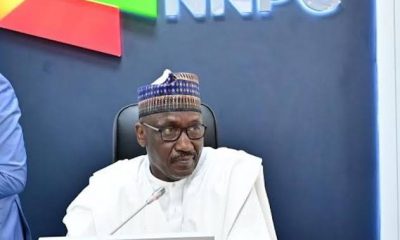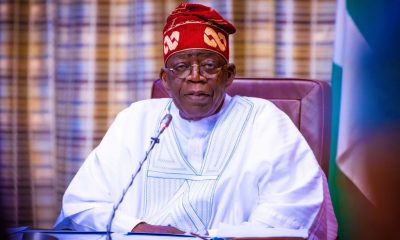Business
Subsidy removal: Youths commend Kyari’s transparency drive, urge Nigerians to be patient

Subsidy removal: Youths commend Kyari’s transparency drive, urge Nigerians to be patient
Nigerian youths have commended the group chief executive officer of the Nigerian National Petroleum Company Limited (NNPC Ltd), Mallam Mele Kyari, for promoting transparency, probity, accountability, and good governance in the Nigerian oil and gas industry vis-à-vis his handling of the recent fuel subsidy removal initiative.
The youths, under the aegis of the Nigerian Youths Alliance (NYA) made this known in a statement co-signed by its national president, Ifeanyi Ogbu, and secretary, Yemisi Oluwadamiro, in Abuja, on Wednesday.
The group specifically lauded the NNPCL chief over his transparency in the company’s payment of an interim dividend of N123 billion to the Federation Account Allocation Committee (FAAC) for the month of June, barely two months after the federal government stopped subsidy payments.
While calling on Nigerians to be patient with the government over the temporary pains caused by the removal of the petrol subsidy, the group urged the NNPCL chief to remain focused and avoid distraction sponsored by oppositions, anti-democratic elements and corrupt individuals who had fed fat by milking the country with the subsidy payment scheme.
According to the statement, “As Nigerian youths, even in these trying times, we must recognize, commend and encourage the efforts of our patriots who are having sleepless nights to ensure this nation works.
“Without mincing words, we know that at this time, fuel subsidy must go if this country must rise from its dying state and survive.
“Many oil marketers and corrupt individuals had become billionaires overnight at the expense of Nigerians with the continued payment of subsidies and these funds could have been channelled to better the lives of Nigerians and grow the economy.
“These individuals by their sheer unconscionable criminality subverted the noble idea behind the subsidy programme, which was for government to subsidize the cost of petrol to make it affordable to the masses. Rather than keep to the terms of the deal with government, these marketers and their crooked allies repeatedly divert and smuggle petroleum products to neighbouring countries where they sell at higher rates and thus make more profit even after collecting subsidy money from the Nigerian government.
“Though, it comes with sacrifices, but Nigerians must know that there is no gain without pain.
“Therefore, we commend the bold and audacious initiatives of the President Bola Tinubu
administration.
“The removal of the fuel subsidy is not about the president or the group chief executive officer of the NNPC Limited, but about the good and wellness of Nigerians.
“It’s however sad that oppositions and some corrupt elements who are angered that their ill source of wealth has been blocked with the removal of subsidy have continued to sponsor hatred and lies against the hardworking chief executive of the NNPCL, Mallam Mele Kyari.
“We are, however, not surprised because every genuine change for growth meets strong resistance and force, and someone must bear the brunt.
“In the history of the oil company, Mr. Kyari has proven to be man of selfless service, integrity, outstanding astute industry technocrat, a a professional par excellence.
“Nigerians will attest to the fact that Kyari’s achievements have surpassed all his predecessors for the past 20 years.
“He has distinguished himself to be a visionary and professional manager with a towering repertoire of the inner workings of the industry, having served in various positions over the years.
“In barely two months since the government stopped payment of fuel subsidy payment, he delivered a whopping N123 billion to FAAC. This is commendable.
“Before his assumption of office as the GMD of the defunct NNPC; there were a lot of unresolved and knotty issues lingering and hampering the sector from achieving its potential. He stepped in and proffered solutions to them.
“Even before the passage of the Petroleum Industry Act 2021, which he promoted, Kyari convinced Nigerians of the new direction of the NNPC by making the financial books open transparently for public probity which has changed the opacity in the system.
“NNPC financial books have never been opened transparently for public scrutiny over the years, but Kyari changed the narratives.
“He has effectively deployed his wealth of experience to spearhead giant innovations which have helped in repositioning the NNPC today.
“In his bid to put an end to the business of oil thieves, in 2022, Kyari introduced the “Crude Theft Monitoring Application” (CTMA) to check the theft of Nigeria’s oil. The CTMA, which has been helpful in preventing oil theft, has application options for reporting incidents, with prompt follow-up and responses and another one for crude sales documents validation.
“Not quite long after Kyari assumed office, the stifling Covid-19 pandemic hit the world economy which adversely affected the petroleum industry real hard, the price of crude oil dropped sharply in the international market which affected our revenue earnings drastically but with resilience and careful handling of its affairs, we were able to come out stronger.
“While we plead with Nigerians to be patient as the dividends for their current pains will come soon, we urge the new NNPCL and its management to remain focused and sustain their good works even as the country navigates through these trying moments.”
Business
Nigeria’s Inflation Drops to 15.10% as NBS Reports Deflationary Trend

Nigeria’s headline inflation rate declined to 15.10 per cent in January 2026, marking a significant drop from 27.61 per cent recorded in January 2025, according to the latest Consumer Price Index (CPI) report released by the National Bureau of Statistics.
The report also showed that month-on-month inflation recorded a deflationary trend of –2.88 per cent, representing a 3.42 percentage-point decrease compared to December 2025. Analysts say the development signals easing price pressures across key sectors of the economy.
Food inflation stood at 8.89 per cent year-on-year, down from 29.63 per cent in January 2025. On a month-on-month basis, food prices declined by 6.02 per cent, reflecting lower costs in several staple commodities.
The data suggests a sustained downward trajectory in inflation over the past 12 months, pointing to improving macroeconomic stability.
The administration of President Bola Ahmed Tinubu has consistently attributed recent economic adjustments to ongoing fiscal and monetary reforms aimed at stabilising prices, boosting agricultural output, and strengthening domestic supply chains.
Economic analysts note that while the latest figures indicate progress, sustaining the downward trend will depend on continued policy discipline, exchange rate stability, and improvements in food production and distribution.
The January report provides one of the clearest indications yet that inflationary pressures, which surged in early 2025, may be moderating.
Bank
Alpha Morgan to Host 19th Economic Review Webinar

Alpha Morgan to Host 19th Economic Review Webinar
In an economy shaped by constant shifts, the edge often belongs to those with the right information.
On Wednesday, February 25, 2026, Alpha Morgan Bank will host the 19th edition of its Economic Review Webinar, a high-level thought leadership session designed to equip businesses, investors, and individuals with timely financial and economic insight.
The session, which will hold live on Zoom at 10:00am WAT and will feature economist Bismarck Rewane, who will examine the key signals influencing Nigeria’s economic direction in 2026, including policy trends, market movements, and global developments shaping the local landscape.
With a consistent track record of delivering clarity in uncertain times, the Alpha Morgan Economic Review continues to provide practical context for decision-making in a dynamic environment.
Registration for the 19th Alpha Morgan Economic Review is free and can be completed via https://bit.ly/registeramerseries19
It is a bi-monthly platform that is open to the public and is held virtually.
Visit www.alphamorganbank to know more.
Business
GTBank Launches Quick Airtime Loan at 2.95%

GTBank Launches Quick Airtime Loan at 2.95%
Guaranty Trust Bank Ltd (GTBank), the flagship banking franchise of GTCO Plc, Africa’s leading financial services group, today announced the launch of Quick Airtime Loan, an innovative digital solution that gives customers instant access to airtime when they run out of call credit and have limited funds in their bank accounts, ensuring customers can stay connected when it matters most.
In today’s always-on world, running out of airtime is more than a minor inconvenience. It can mean missed opportunities, disrupted plans, and lost connections, often at the very moment when funds are tight, and options are limited. Quick Airtime Loan was created to solve this problem, offering customers instant access to airtime on credit, directly from their bank. With Quick Airtime Loan, eligible GTBank customers can access from ₦100 and up to ₦10,000 by dialing *737*90#. Available across all major mobile networks in Nigeria, the service will soon expand to include data loans, further strengthening its proposition as a reliable on-demand platform.
For years, the airtime credit market has been dominated by Telcos, where charges for this service are at 15%. GTBank is now changing the narrative by offering a customer-centric, bank-led digital alternative priced at 2.95%. Built on transparency, convenience and affordability, Quick Airtime Loan has the potential to broaden access to airtime, deliver meaningful cost savings for millions of Nigerians, and redefine how financial services show up in everyday life, not just in banking moments.
Commenting on the product launch, Miriam Olusanya, Managing Director of Guaranty Trust Bank Ltd, said: “Quick Airtime Loan reflects GTBank’s continued focus on delivering digital solutions that are relevant, accessible, and built around real customer needs. The solution underscores the power of a connected financial ecosystem, combining GTBank’s digital reach and lending expertise with the capabilities of HabariPay to deliver a smooth, end-to-end experience. By leveraging unique strengths across the Group, we are able to accelerate innovation, strengthen execution, and deliver a more integrated customer experience across all our service channels.”
Importantly, Quick Airtime Loan highlights GTCO’s evolution as a fully diversified financial services group. Leveraging HabariPay’s Squad, the solution reinforces the Group’s ecosystem proposition by bringing together banking, payment technology, and digital channels to deliver intuitive, one-stop experiences for customers.
With this new product launch, Guaranty Trust Bank is extending its legacy of pioneering digital-first solutions that have redefined customer access to financial services across the industry, building on the proven strength of its widely adopted QuickCredit offering and the convenience of the Bank’s iconic *737# USSD Banking platform.
About Guaranty Trust Bank
Guaranty Trust Bank (GTBank) is the flagship banking franchise of GTCO Plc, a leading financial services group with a strong presence across Africa and the United Kingdom. The Bank is widely recognized for its leadership in digital banking, customer experience, and innovative financial solutions that deliver value to individuals, businesses, and communities.
About HabariPay
HabariPay is the payments fintech subsidiary of GTCO Plc, focused on enabling fast, secure, and accessible digital payments for individuals and businesses. By integrating payments and digital technology, HabariPay supports innovative services that make everyday financial interactions simpler and more seamless.
Enquiries:
GTCO
Group Corporate Communication
[email protected]
+234-1-2715227
www.gtcoplc.com
-

 celebrity radar - gossips6 months ago
celebrity radar - gossips6 months agoWhy Babangida’s Hilltop Home Became Nigeria’s Political “Mecca”
-

 society6 months ago
society6 months agoPower is a Loan, Not a Possession: The Sacred Duty of Planting People
-

 society5 months ago
society5 months agoReligion: Africa’s Oldest Weapon of Enslavement and the Forgotten Truth
-

 news6 months ago
news6 months agoTHE APPOINTMENT OF WASIU AYINDE BY THE FEDERAL GOVERNMENT AS AN AMBASSADOR SOUNDS EMBARRASSING










